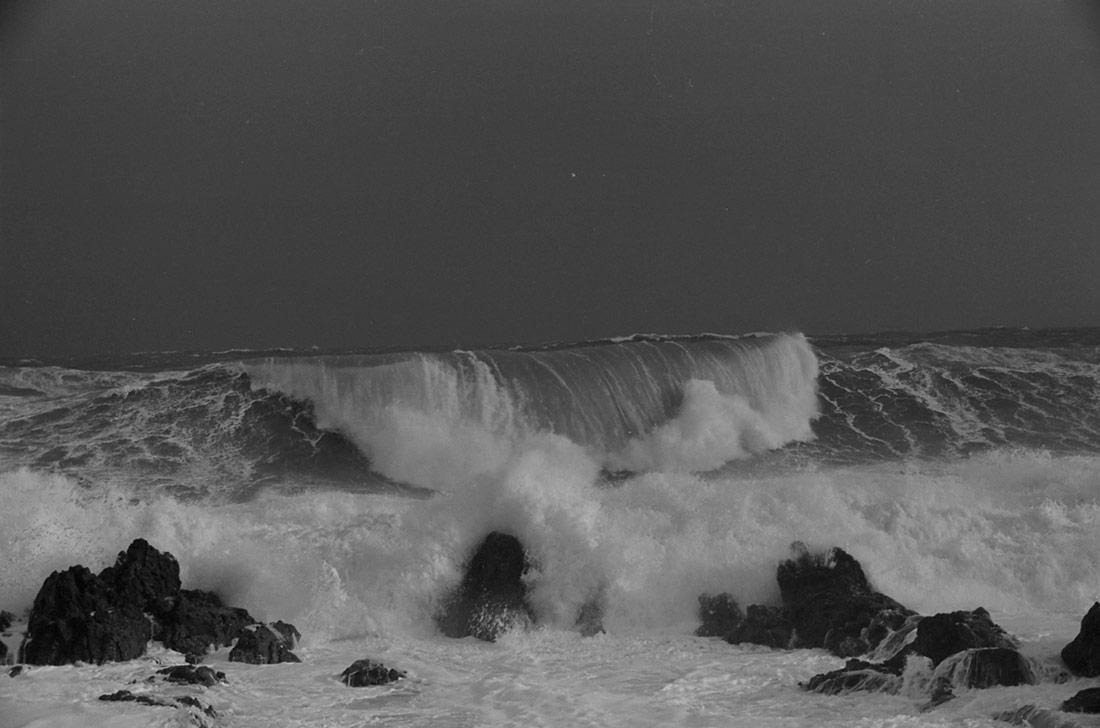
Waves breaking over rocks. Wellington, 1940 | Eric Lee-Johnson, Museum of New Zealand Te Papa Tongarewa | No known copyright restrictions
The world awaits the great wave that will engulf the earth. But faced with the certainty that the end is nigh, there are those who look destiny in the eye and embrace it, with an awareness of responsibility and a longing for rebirth.
The cove seems to be wrapped in an embrace. An embrace can be as alarming as it is precious, a smothering balm. Within the embrace not much more can be heard than the intimacy of calm. The war outside is muted. Sounds become muffled, cacophonies fall on numbed ears. Like being in the water. There is a lot of water in the cove. Wave after wave after wave, day and night. The unceasing murmur, constant and absolute as it is, becomes silent. Just like the embrace, which is so tight that the body faints and consolation collapses.
While the water nullifies the sound of the earth, the earth howls. The screech of wheels of the umpteenth fleeing car, the din of hundreds of horns on the crawling motorways, that banging on the metal doors of looted warehouses, the crackle of branches in the raging flames, and the shots, above all the shots, the exploding gunpowder of those who cannot wait.
Those in the cove, on the other hand, wait calmly. They understand the inevitability and they inhabit it without looking at the clock. They order the day with the light, count the time with the waves. They have become larger, more frequent. The waves tell them about the spent world. They wash up debris, fragments, waste. All plastic, all petroleum. And dead fish. The stink of the cove is a dense embrace, lichen and greasy algae instead of arms and hands. The people in the cove do not turn their noses up at the fish. They cook it on the embers that smoke constantly towards the sky and mix with the mist that rises from the nearby woods. Nobody looks at the sky because the sea is more present. The present is not worth much, but the people waiting in the cove live all of it. As long as it exists, as long as it exists.
They have been there for days. Perhaps ten, perhaps a few more. Looking back it’s the same, looking forwards it’s the end. The end is very near. They know this because they are told so by the water, which is more turbulent, and because it is echoed by the earth, which is warmer. Sometimes, the heat shakes everything, the rocks crack, a few of them fall, the rumble breaks the silence of the roar and someone shudders and someone else wonders if there is any difference between the embrace of a rock and that of a wave. There is always someone who responds with a few verses, who intertwines fear and love, who asks that the sea be cherished despite the rage. There is always someone who cries. And it is a muffled cry that dies in the water and is reborn as a wave. Each wave carries an embrace.
They talk a lot about the last embrace. They say they await it with open arms. They know that the world is no longer waiting for anything. That the cars don’t go anywhere anymore and that the fires have burnt everything to the ground. The ash that fills the air smells of petrol and pine needles and burnt skin. Animal or human, it’s all the same. It is all life, in the end. Or it was.
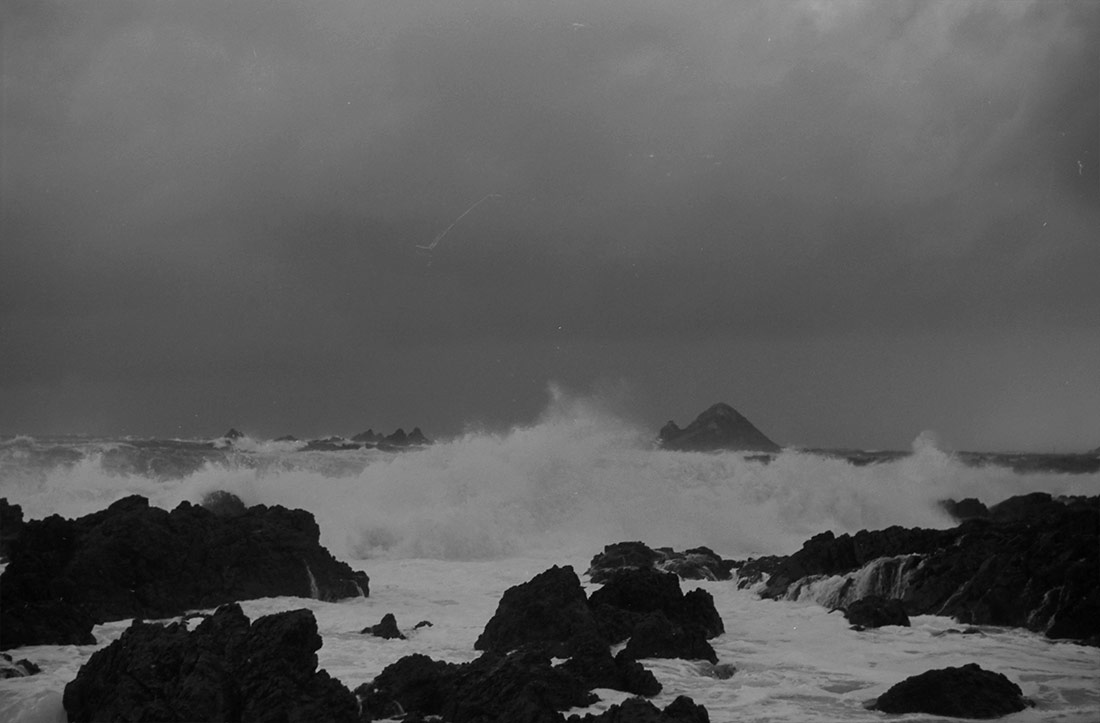
Waves breaking over rocks. Wellington, 1940 | Eric Lee-Johnson, Museum of New Zealand Te Papa Tongarewa | No known copyright restrictions
One morning, among the rubbish washed up by the water, a body appears, then another, then another. At the end of the day there is a collection of corpses with blue skin and blurred features, but despite this, despite the faded eyes and swollen cheeks, the people in the cove know that they come from far away. That the tide has dragged them from other shores, from other lands, from other continents. They lay the bodies out on the sand and sit down beside them to dine on dead fish. They are all remnants of the world that no longer exists. They are proof of the collapse.
They announced it a few weeks ago as “The Collapse!” When all the world’s seismographs spoke all at once. In a deep spot that no one could pinpoint precisely, in the last of the oceanic holes, the mother of all waves was brewing. And it would be a rageful mother, they said, a wall of cruel water that would engulf the earth! But wait – the mother would only be the prelude. Because in synchrony, in the most furious choreography, would come her daughters, her granddaughters, her great-granddaughters, forebearers and offspring, ghosts and embryos of waves, the whole lineage that would emerge from the deepest of depths like an implacable army. That would wipe away the border between water and land.
What happened after that announcement was also a wave. Of suicides, in this case. People didn’t want to, couldn’t, wait for death – they threw themselves into it. Headfirst into the gunpowder instead of the water. The people in the cove are not those people. The people in the cove are patient and have no fear of urgency. They have turned that last piece of land lapped by the sea into a shrine to venerate the world they have destroyed. The people in the cove are fully aware of their responsibility. It is our doing, all of it. We have exploited it, we have raped it, we have abused it. The people in the cove are fully aware of the opportunity. The yearning for a renewed world, a utopia rising from the wreckage, for life to emerge wiser from the depths.
And now they await thus, straight and attentive, the embrace of devastation. There is no despair, there is salvation. They are certain that the last of the waves will be the force that will kill death. They do not know death but they acknowledge its mystery. The ocean will connect us to the unknown, they say. The depths of the ocean and the vastness of the universe are, fatally and inescapably, the same. The unknown is the essence of our existence. The people in the cove do not see themselves as victims, they know themselves to be pioneers of a future that no one knows, they are ready to embrace whatever lies beyond.
What lies beyond is here now. The silence screams and deafens the roar of life that dies and is born, all at once, from the abyss. The wave is an abyss inside out. Metres and metres of water climbing upwards, a liquid ravine, a twisting wall that crashes against the shore, against life. The people in the cove surrender themselves to the impact. They embrace the wave. At the summit of the abyss, at the top of the wave, there is the bottom. They cannot see it, but they sense it, and it is always the same – the consolation of collapse.

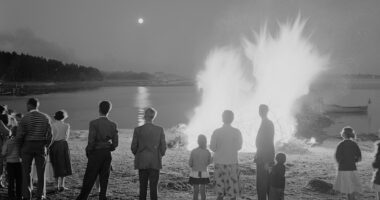
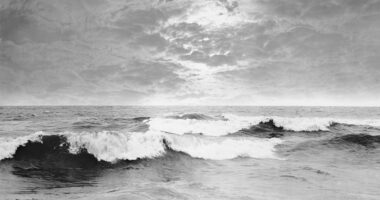
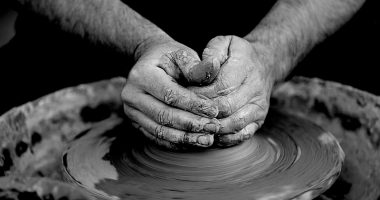

Leave a comment